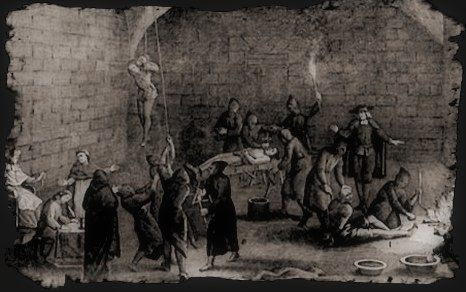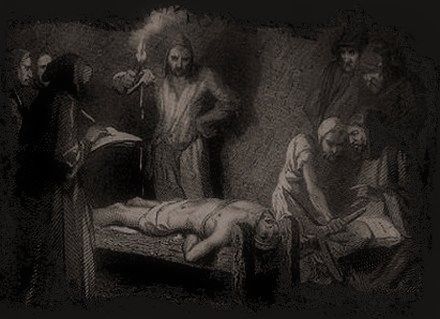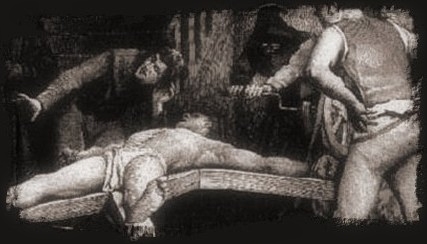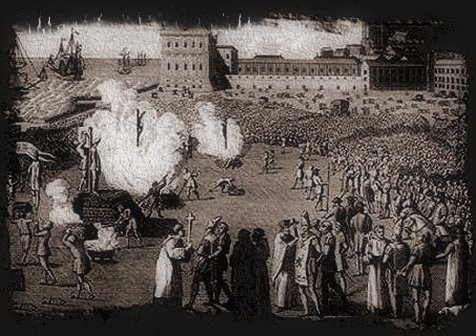The Inquisitions - Religion - Nairaland
Nairaland Forum / Nairaland / General / Religion / The Inquisitions (1553 Views)
What Were The Inquisitions? (2) (3) (4)
| The Inquisitions by Nobody: 11:41pm On Jul 26, 2016 |
  Giving Europe the Third Degree: The Inquisitions If the door-to-atheist opinion was open just a crack in ancient Greece and Rome, it slammed shut completely in 381 CE. That’s the year Roman emperor Theodosius took a break from overseeing the collapse of the empire to ban all religious opinions other than his own, which was Nicene Christianity. The Christian church fathers spent the early medieval period sorting out what constituted the church’s official doctrine, banning this or that departure from the party line. For seven hundred years, it seemed to work because heresy (beliefs or practices that differ from those official sanctioned by the church) went fairly quiet. But by the mid-12th century, new movements within Christianity began finding adherents and all hell broke loose. The Inquisition was a long campaign by the Roman Catholic Church to eliminate unorthodox beliefs and practices in Europe by use of interrogation, torture, and even execution. It continued on and off for more than 600 years with the purpose of securing Catholic religious and political control over the continent. This Thread introduces in greater depth what the Inquisition did through the stories of three otherwise unknown villagers in 14th-century southern France, as well as the man who interrogated them for unorthodox thinking. [/b] 3 Likes |
| Re: The Inquisitions by Nobody: 11:42pm On Jul 26, 2016 |
Eyeing the Inquisition’s main focus [b] The Inquisition’s main concern wasn’t nonbelievers. Nobody cared too much about the occasional French peasant muttering to himself about God being pretend. The idea was to root out fellow Christians who are forming sects that differed from the orthodox norm differing sometimes (like many denominations today) in seemingly tiny ways. But the Catholic powers at the time perceived any organized movement to be a threat, so the Inquisitions ground on, generation after generation, casting a wide net to pull in heretics and give them a choice: Conform, or pay a terrible price. The usual procedure follows instructions in Deuteronomy 17: If a man or woman living among you . . . has worshiped other gods . . . and this has been brought to your attention, then you must investigate it thoroughly. If it is true . . . on the testimony of two or three witnesses, a person is to be put to death. So the Inquisitor generally began by finding two or three witnesses against someone suspected of heresy before interrogating the actual suspect. [/b] 3 Likes |
| Re: The Inquisitions by ValentineMary(m): 6:37am On Jul 27, 2016 |
Make I buy land for here first. OP carry on.  |
| Re: The Inquisitions by Nobody: 9:25am On Jul 27, 2016 |
Meeting Jacques Fournier, Inquisitor [b] After an uneventful childhood in late 13th-century France, Jacques Fournier first became a monk, then a bishop in the local Catholic diocese. In 1317, he moved on to the Big Dance as an Inquisitor for the Catholic Church. Fournier was ordered to begin local interrogations to smoke out adherents of Catharism, a sect that believed the good, spiritual God had an evil, physical counterpart, Rex Mundi, and that Rex, not God, created the world. That would answer the question of why evil exists and there was an overabundance of evil in the 14th century but it tinkered too much with the rest of theology to be acceptable to the Church. Though the Catholic Church claimed it was all about theological differences, the Cathar habit of loudly pointing out the corrupt behavior of Catholic clergy surely had something to do with the attention the Cathars received. The Catholic Church did its level best to kill off every last Cathar in a 45-year crusade during the previous century,and for a generation or two it seemed to have worked. But reports of Cathar activity in southern France surfaced again by 1317, and Fournier was tasked with bringing the heretics in his region to the Pope’s justice. Fournier wasn’t the only Inquisitor at the time, but he took the unusual step of having his interrogations transcribed in exquisite detail. Those transcripts make him pretty useful for my purposes, because while Fournier trawled around for Cathar heretics, once in a while he caught . . . an actual atheist. Of 578 people interrogated by Fournier, five were executed. Most of the rest, including those I introduce in the next Post, were either imprisoned or forced to wear a double yellow cross, a mark of shame, for the rest of their lives. Fournier’s efforts were rewarded a few years later when he was first appointed cardinal, then elected Pope Benedict XII. [/b] 3 Likes |
| Re: The Inquisitions by Nobody: 9:27am On Jul 27, 2016 |
Finding unbelievers among the heretics [b] Jacques Fournier was probably surprised when his interrogations turned up an actual unbeliever rather than a heretic, but it did happen, more than once. And here’s where it gets personal. These stories aren’t of philosophers putting forward a challenging opinion in the marketplace of ideas, but everyday folks whose friends and family often reported them to the authorities for honest expressions of doubt. I introduce you to three such doubters, villagers in southern France in the early 14th century who were caught in the net of the Inquisition. Aude of Merviel In 1318, two years into his new post as Inquisitor, Fournier interrogated a woman named Aude of the village of Merviel. Aude had come to doubt transubstantiation, the Catholic doctrine that says the bread and wine of the Eucharist change into the literal body and blood of Christ (though human senses don’t perceive the change). This doubt apparently led her further into disbelief, until she cried out to her husband, “Sir, how is it possible that I cannot believe in our Lord!” He swore and threatened her, then ordered her to confess to the priest. The following week, Aude told her aunt the same thing and pled for help: “Aunt, what might I do to believe in God, and to believe that the body of Christ is really on the altar?” Brought in as a witness against Aude, the aunt testified about what she said to Aude in reply,which boiled down to Try harder to believe and don’t infect others with your foul ideas! Imagining Aude’s anguish is painful as she spilled her honest doubts in front of her husband, her aunt, and finally the Inquisitor, meeting nothing but fear and anger at every turn. In the end, she was sentenced to wear a double yellow cross on her back for the remainder of her life. [/b] 3 Likes |
| Re: The Inquisitions by Nobody: 10:38am On Jul 27, 2016 |
Guillemette of Ornolac [b] Guillemette of Ornolac ended up in the Inquisitor’s chair because she told others seemingly everyone she knew that she doubted the existence of the soul. Called before the Bishop, one friend of hers described a conversation the two of them had the year before. When the friend had told Guillemette that she was afraid for her own soul because she sinned so often, Guillemette replied, “The soul? You idiot! The soul is nothing more than blood.” The friend told the Inquisitor that she told Guillemette to never say such a thing, to which Guillemette supposedly replied that she’d say it in front of anyone she liked, adding, “And what would happen to me if I did?” Bishop Fournier called in another neighbor, who described a conversation in which Guillemette expounded on her reasoning a bit. When she cut off the head of a goose, the goose lived until the blood was gone, so she reasoned that what people call “soul” the essence of life is nothing more than blood. Finally Fournier called in Guillemette. Under Fournier’s questioning, she confessed not only to her idea that the soul is blood, but also to the opinion that death is final. When Fournier asked, “Did someone teach this to you?” this is the greatest concern, of course, the spread of unapproved ideas Guillemette said something wonderful: “No. I thought it over and believed it by myself.” She assured Fournier at last that her folly was in the past, and that she had returned to fully orthodox beliefs. When he asked what caused the change, she answered with unbearable honesty: “I heard tell that My Lord the Bishop wanted to carry out an investigation against me about it. I was afraid of My Lord Bishop because of that, and I changed my opinion after that time.” Like Audi, she was sentenced to wear a double yellow cross on her back for the rest of her life. [/b] 3 Likes |
| Re: The Inquisitions by Nobody: 10:50am On Jul 27, 2016 |
Raimond de l’Aire The most colorful of Fournier’s suspects was Raimond de l’Aire, a villager who seemed like Diagoras reborn Witnesses described Raimond saying that God never made the world, that the world had always existed, that the resurrection was a myth, that the Eucharist was nothing more than bread and wine, that the rituals of the priests meant nothing, and that he gave to the poor not for his soul but so that others would see him as a good man. At one point he apparently told a friend that Christ was created not through divine intervention, but “just through screwing, like everybody else” then struck the heel of one hand against the other repeatedly to underline the point. The witness assured Fournier that he told Raimond he was speaking evil and deserved to be killed. Whether he actually was killed isn’t recorded.... 3 Likes |
| Re: The Inquisitions by Nobody: 10:52am On Jul 27, 2016 |
1 Like |
| Re: The Inquisitions by Nobody: 11:07am On Jul 27, 2016 |
 The inquisition put their victims to the test (here using the rack) The inquisition put their victims to the test (here using the rack)Most defendants confessed in the long run in order to escape the great anguish and bitter torture. Once found guilty (regardless) they were handed over to the civil authorities to be "relaxed" (that is of course, burnt alive) 3 Likes |
| Re: The Inquisitions by Nobody: 11:14am On Jul 27, 2016 |
[b]Refusing to confess at the first hearing, saw heretics being remanded to the prisons for several months. The dungeons were situated underground, so that the outcries of the subject might not reach other parts of the building. In some medieval cells, the inauspicious were bound in stocks or chains, unable to move about and forced to sleep standing up or on the ground. In some cases there was no light or ventilation, inmates were generally starved and kept in solitary confinement in the dark and allowed no contact with the outside world, including that of their own family. In 1252, Pope Innocent IV officially authorized the creation of the horrifying Inquisition torture chambers. It also included anew perpetual imprisonment or death at the stake without the bishops consent. Acquittal of the accused was now virtually impossible. Thus, with a license granted by the pope himself, Inquisitors were free to explore the depths of horror and cruelty. Dressed as black-robed fiends with black cowls over their heads, Inquisitors could extract confessions from just about anyone. The Inquisition invented every conceivable devise to inflict pain by slowly dismembering and dislocating the body. Many of the devices were inscribed with the motto "Glory be only to God." Bernardus Guidonis, the Inquisitor in Toulouse instructed the layman as to never argue with the unbeliever, but as to "thrust his sword into the man's belly as far as it will go." George Ryley Scott describes how the inquisitors, gorged with their inhumanity, and developed a degree of callousness rarely rivaled in the annals of civilization, with the ecclesiastical authorities condemning every faith outside of Christianity as demonic. Even the very fact of having a charge brought against you, and of being summoned to the Inquisition was sufficient to strike abject terror into the bravest man or woman. For very few who entered the doors of that halls of torment emerged whole in mind and body. If they escaped with their life, they were, with rare exceptions, maimed, physically or mentally forever. Those who did happen to endure the dungeons generally went mad in captivity, screaming out in despair to escape their purgatories. Others willingly committed suicide during their confinement. The defendant were known to incriminate themselves at any chance they had to escape the horrors. As Henry Charles Lea describes, one of the conditions of escaping the penalties was that they stated all they knew of other heretics and apostates, under the general terror, there was little hesitation in denouncing not only friends and acquaintances, but the nearest and dearest kindred--parents, children, brothers and sisters--this ultimately and indefinitely prolonged the Inquisitions through their associates. In the ages of faith, when the priest, was little less than a God himself, a curse from his lips was often more feared than physical torments. To even establish an accusation against a bishop itself required 72 witnesses; against a deacon was 27; against an inferior dignitary was 7, and for non-members of the clergy, 2 was sufficient to convict. Whole communities went mad with grief and fear of the thought towards being denounced to the Inquisition. It spread all over Europe. Men, women, and children, all legally murdered on evidence by a church, which today would only be accepted unless the court and jury specifically composed of the inmates of a lunatic asylum.  During the course, defendants had no rights to counsel or advice, and was even denied the right to know the names of their accusers. No favorable evidence or character witnesses were permitted. In any case, one who even spoke for an accused heretic would be arrested as an accomplice. Never would a prisoner of the Inquisition have seen the accusation against himself, or any other. All efforts relating to time, place, and person were carefully concealed.[/b] 3 Likes |
| Re: The Inquisitions by Nobody: 11:27am On Jul 27, 2016 |
Tomas, who's duty was to organize the rules of inquisitorial procedures in Seville, Castille and Aragon. He believed punishment of heretics, was the only way to achieve political and religious unity in Spain. Those refusing to accept Catholicism where lead to the stake and burnt alive in a procession and Catholic ceremony known as "auto-de-fe'" (act of faith).  The conclusion of an "auto de fe". Huge public burnings took place of those convicted of Heresy. 3 Likes |
| Re: The Inquisitions by Nobody: 8:12am On Aug 23, 2016 |
no problem we know all these, blessed are those who were persecuted for my sake, Protestant Christians were persecuted, non-believers were persecuted but these acts were carried out by men who had selfish, political reasons n were backed by dogmatism n fanaticism, they simply used the Umbrella of Christianity to carry out their atrocity we know the message of Jesus preaches peace, we've endured 2000years, we'll continue to prosper... With true Christians Jesus walks on after 2000 years in Us.. |
| Re: The Inquisitions by Deicide: 4:42pm On Aug 23, 2016 |
ChykePryor:Can U say this same thing for Islam also? |
| Re: The Inquisitions by cbravo(m): 4:17am On Apr 11, 2017 |
The common good in jacques maritain:A philosophical appraisal http://www.bravoprojecthelp.com/philosophy/the-common-good-in-jacques-maritaina-philosophical-appraisal/ |
| Re: The Inquisitions by cbravo2: 1:42pm On Apr 13, 2017 |
The common good in jacques maritain:A philosophical appraisal http://www.bravoprojecthelp.com/philosophy/the-common-good-in-jacques-maritaina-philosophical-appraisal/ |
(1) (Reply)
Covenant Day Of Open Doors! / The Fault Of Apostle johnson Suleiman - I Am A Witness / Rev. Mbaka To Resign As Prophet If This Doesn't Happen On October 1 (must See)
(Go Up)
| Sections: politics (1) business autos (1) jobs (1) career education (1) romance computers phones travel sports fashion health religion celebs tv-movies music-radio literature webmasters programming techmarket Links: (1) (2) (3) (4) (5) (6) (7) (8) (9) (10) Nairaland - Copyright © 2005 - 2024 Oluwaseun Osewa. All rights reserved. See How To Advertise. 41 |